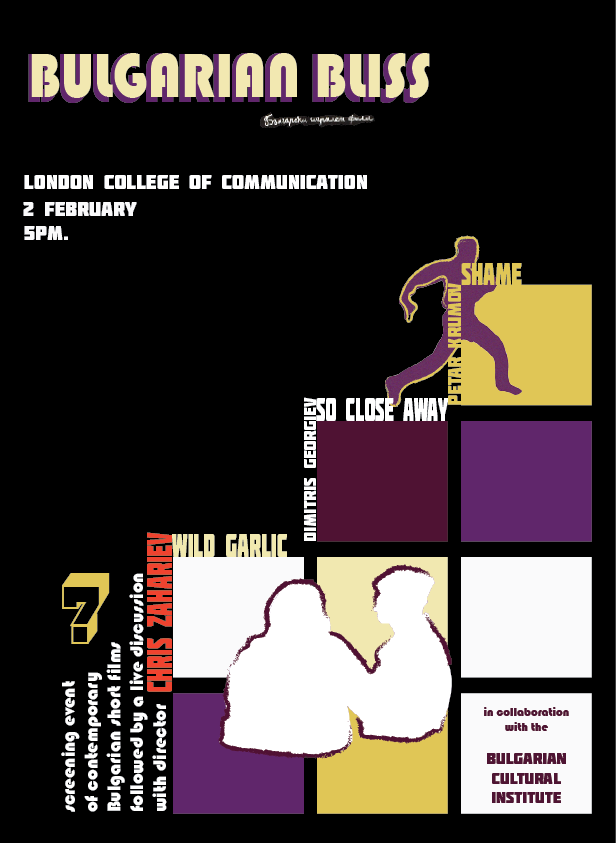Bulgarian Bliss

Моля обърнете внимание: Това събитие ще бъде само на Английски език!
FASE is a series of screening events originally created by students in University of the Arts in London. The 2022 edition of the project will include two screening focused specifically around Bulgarian cinema. Both events made possible in collaboration with the Bulgarian Cultural Institute.
The Bulgarian Bliss (02.02.2022, at London College of Communication) is a screening event that presents a national cinema to an international audience. It aims to explore the boundaries of filmmaking in a country where the concepts of visual culture are gradually advancing, and the latest generation of young creatives explore new and untouched artistic grounds.
The programme presents three Bulgarian short films. The common trait all three have is the constant search for a sense of belonging and the unsure perception of reality in a post-communist territory. The stories that are beautifully unfolding introduce strong characters with a certain dis-ease of the self, caused by the extreme social circumstances that accompany their daily lives. The whole event has a 2-hour duration, as the screenings are 1h 19mins and the following discussion panel will be around 30 minutes. Chris Zahariev (director of Wild Garlic) will be present at the event as the main guest for the Q&A. He will not only talk about his film, but will also focus on the neglected topic of being an emerging artist in a country with an influential Soviet past.
Programme:
WILD GARLIC (Chris Zahariev, 2019) 25’
Two people of different ages and different backgrounds find themselves in the same place, where they face the fate of the other and rethink their own choices. The film tells the unusual story of a criminal and an old lady who meet in a small Bulgarian village.
SO CLOSE AWAY (Dimitris Georgiev, 2020) 30’
A black-and-white voyage that traces two men running away from Sofia Central Prison in the middle of the day. The story is locked withing the limitless lust for freedom and the strong feelings of loneliness and fear a human soul can experience.
SHAME (Petar Krumov, 2018) 24’
Macho is a poor boy, who skips school to work on a construction site. The only ray of light for him is his girlfriend, Donna .Yet, she is ashamed of his mother, who works as janitor in their school. Macho has to choose between his mother and his love, and he finds his own way to deal with his emotions.
………………………………………
Blood Manifesto (31.01.2022, at London College of Communication) aims to introduce Theodore Ushev’s work to an international audience who are likely to be largely unaware of his films.
Ushev’s work is of paramount importance to Bulgaria as he draws on Bulgarian folklore and tradition as well as the work of other Bulgarian artists, such as author Georgi Gospodinov. Ushev earned major recognition for his short animation Blind Vaysha (2016) in 2017 when it was nominated in the Best Animated Short category at the 89th Academy Awards. The film stood out due to the linocut-style that Ushev achieved using a Cintiq tablet, and for its fascinating plot based on a work of Gospodinov which revolves around a girl who sees the past out of her left eye and the future through her right, making it impossible for her to live in the present.
The event programme consists of four other short animations and a music video by Ushev. First is The Man Who Waited (2006) which is an adaption of a parable by Franz Kafka. A sense of hopelessness is apparent as a man spends his life in a fruitless quest for truth and fulfilment.
The second short Gloria Victoria (2013) is distinctly anti-war as Ushev recreates images that represent the bloody horrors of war, from the bombing of Dresden in World War II to Star Wars. Here he credits the styles of expressionism, constructivism, cubism, and surrealism.
Next up is Blood Manifesto (2015) which depicts a world full of injustice through the medium of Ushev’s own blood (Disclosure: Images of blood throughout which some viewers may find distressing). This will then be followed by Blind Vaysha.
The last film The Physics of Sorrow (2019) is the longest work in the line-up clocking in at 27-minutes and is again based on a work by Georgi Gospodinov which follows a man as he reminisces about his childhood and attempts to understand the purpose of his life.
The final piece of work to be screened is a music video for the song Demoni (2012) by Bulgarian musician Kottarashky, which features visuals by Ushev. The event will conclude with a Q&A with Ushev himself over Zoom.
Both events are free and everyone is invited to attend! More updates on: https://fase.arts.ac.uk/


